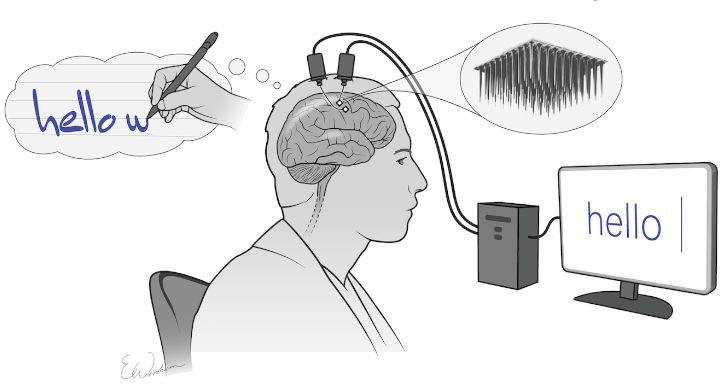Brain Implant Enables Paralyzed Man to Write Using His Thoughts
A group of scientists has developed an early prototype of an implant that enables paralyzed people to write. The new method is much faster than current solutions. How many characters can be written in a minute this way?

- A research team at HHMI is working on a neural interface capable of rapidly converting impulses into text;
- Their BCI allows for thought-controlled writing at a rate of 90 characters per minute.
Neuralink is a major advance in understanding nerve impulses. However, Elon Musk isn't the only one working on reading human brain. Many teams of scientists are interested in this niche of bioengineering. Researchers at the Howard Hughes Medical Institute (HHMI), led by Professor Krishna V. Shenoy have discovered a way to significantly speed up writing for paralyzed people.
The researchers placed implants in the area of the brain that is responsible for communicating with muscles in the hand. They then asked the test patient, who was a 65-year-old man paralyzed from the neck down, to imagine that he took a pen in his hand and began to write. Thanks to electrodes with which the implants were equipped, the patterns of individual letters and several additional characters were recorded.
In this way, the device called BCI (Brain-Computer Interface) was created, which is currently in the early prototype phase. It is based on almost 200 electrodes placed in the premotor cortex of the brain, thanks to which it is able to read patterns of neuron activity and, using AI-based neural networks, interpret them as letters displayed on a computer screen. The BCI can achieve a typing speed of up to 90 characters per minute which is much faster than the systems used so far (e.g. eyeball-controlled cursor and on-screen keyboard).

Reliability of character interpretation is currently 95%, and up to 99% with smartphone text correction. Of course, there are also some drawbacks. The device requires weekly calibration due to neuronal changes and the build-up of scar tissue around the implants. At this stage, the BCI cannot recognize capital letters and punctuation marks.
Only one person has participated in the tests so far, and a specific set of words was used. With free writing, character input speed (up to 75/min) and reliability (98%) are slightly lower. It remains to be seen how the BCI will perform in collaboration with other people. There is still a lot of work ahead of the research team, including tests on a larger group of patients. A new interface is a chance for paralyzed people to easily communicate with the world.
- science
- prototypes
- neurology
0

Author: Arkadiusz Strzala
His adventure in writing began with his own blog and contributing to one of the early forums (in the olden days of Wireless Application Protocol). An electrical engineer by profession, he has a passion for technology, constructing and, of course, playing computer games. He has been a newsman and writer for Gamepressure since April 2020. He specializes in energy and space tech. However, he does not shy away from more relaxed matters every now and then. He loves watching science-fiction movies and car channels on YouTube. He mainly plays on the PC, although he has modest console experience too. He prefers real-time strategies, FPS and all sorts of simulators.
Latest News
- Butcher's Summit, an impressive free diselpunk FPS, has been released
- Free FPS on Half Life engine gets big update
- On February 3, gaming history could change forever. Red Dead Redemption 2 one step away from a major achievement
- This is not the RPG you expected. Crimson Desert abandons the key elements of the genre, going for original solutions
- Nintendo may unexpectedly beat Sony. State of Play is not to be the only game show awaiting players in February

